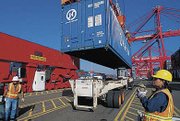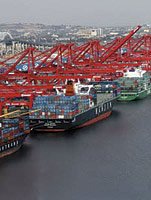This Pass Says Go
The recent congestion at the Port of Los Angeles and Port of Long Beach is now just a bad memory for port officials.
Hoping to avoid a repeat performance, terminal operators are speeding up a plan aimed at easing port congestion next year, when China will become a major apparel and textile producer for the United States.
The plan, headed by a new entity called PierPass Inc., should be in place sometime next March, said Bruce Wargo, general manager of the nonprofit.
Within one month, PierPass hopes to implement five off-peak shifts, during either weeknights or weekends, at all the gates at both ports.
“It’s quite an undertaking and quite risky, but we are dedicated to getting five shifts open at all terminals,” said Wargo, formerly the vice president of product and technology development for Stevedoring Services America Pacific.
Originally, the organization was to have implemented the plan by Nov. 6, adding one additional shift each month during the first five months. But the San Francisco–based Pacific Maritime Association, representing waterfront employers, asked that the plan be delayed while more longshore workers were trained to handle cargo during the extra shifts.
Since August, the International Longshore and Warehouse Union has hired and trained 3,200 part-time casual workers. Plans are to have almost 2,000 additional casual workers trained by early next year.
This is to avoid a repeat of the backlog experienced earlier this year, when as many as 40 ships were anchored off the breakwater waiting to dock and get their cargo unloaded. Starting in July, nearly 120 vessels began giving notice that they would skip docking at Southern California’s ports and make stops instead at Oakland, Calif.; Tacoma, Wash.; or Manzanillo, Mexico.
Gearing up
Wargo, operating in a temporary office in Long Beach, is currently interviewing candidates for the positions of chief financial officer and chief executive officer. Eventually, the organization will have a staff of eight to 10 people to get the program running at full speed.
The idea to accelerate the program came after the West Coast Marine Terminal Operators met on Nov. 3 and decided to move faster to open terminal gates to truckers during evening and weekend hours.
“When it does start, it will probably begin with two additional shifts, but we don’t know whether they will be in the evening or during the weekend,” said Tupper Hall, a PierPass spokesperson.
Currently, all the terminals operate from 8 a.m. to 5 p.m. during the weekdays. But some terminals have their own off-hour schedules. About 15 percent of the cargo containers arriving at the Port of Long Beach are picked up during off hours, said Art Wong, a port spokesperson.
“What will happen is that a retailer like Target will call and say they want to avoid all this daytime traffic and ask the terminal operators to open a nighttime gate for them so their truckers can pick up the loads,” Wong said. “But two-thirds of our customers are smaller than Wal-Mart and Target and don’t do that.”
Long Beach port officials would like to see at least 20 percent to 25 percent of the port’s cargo picked up during off hours, Wong said.
Show me the money
As an incentive to move cargo during off hours, the program will make companies pay a $20 surcharge for every 20-foot-long container and $40 for every 40-foot-long container moved during the weekdays. If companies choose to move those containers during offpeak or weekend hours, they will be excluded from paying the fee.
The fees collected during the day will finance the $150 million-a-year budget it will take to operate the PierPass program, Wargo said.
The PierPass program was started after California Assemblyman Alan Lowenthal (D–Long Beach) introduced legislation earlier this year to make nighttime gate hours mandatory by Jan. 1, 2005, alleviating traffic congestion on the overtaxed freeways.
Lowenthal’s legislation was well received. On May 25, the Assembly voted 44–36 to pass the bill. The state Senate’s Transportation Committee voted 9–2 to send the legislation to the Senate Appropriations Committee. Lowenthal pulled the bill on Aug. 12, after private industry said it would start its own program.
Truckers ticked
One group not enthusiastically endorsing the plan is the California Trucking Association (CTA), whose members transport 85 percent of the goods carried on California’s highways.
“This is being created in a vacuum and thrown at us,” said Stephanie Williams, CTA’s senior vice president.
Truckers have complained that the distribution centers where they drop off their containers are not always open during the evenings or on weekends. Also, truckers want the terminals to have the same services during the off-hour shifts as they have during the daytime, including mechanics or personnel to replace damaged chassis.
PierPass officials said the ports will have the same daytime services during the offhour shifts when the program gears up.
“I don’t think this is going to make a dramatic shift at first,” said Wong from the Port of Long Beach. “It will be a gradual thing. It will take a while.”
Wargo of PierPass agreed that this is not an instant panacea.
“It is not one single thing that will solve the congestion problem,” he said. “This is one of the things that will help solve the problem in the short term.”























